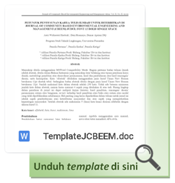Environmentally Smart House Services for the Children in The City of Bekasi, Indonesia
DOI:
https://doi.org/10.23969/jcbeem.v8i2.16869Keywords:
Child Friendly City, Creative and Recreative Childern Facility, Service Coverage, Smart HousesAbstract
The city of Bekasi was awarded as one of child-friendly cities in Indonesia, by the Ministry of Women's Empowerment and Child Protection in 2022. The city government is committed to fulfilling children's rights, included in a Bekasi City Regional Regulation Number 13 of 2017, concerning child friendly cities. To fulfill children's rights, the Bekasi City government built smart homes to improve child-friendly cities. Smart homes are a facility used for the children, which they use to learn, play and create things, without any charge. Currently, there are 7 smart houses built in Bekasi City, with another 5 being planned to be built in every sub district. The aim of this research was to identify the service coverage of 7 smart houses that serve Bekasi City, and to provide some recommendations for those to be built. This research used a mixed method, which involved an observation assessment, a score analysis and a spatial analysis. The results of the study showed that, of the 7 smart houses in Bekasi City located in several subdistricts, two were in good conditions (Pondok Gede and Bekasi Timur), three were in moderate conditions (Bekasi Selatan, Mustika Jaya, Rawa Lumbu), and the remaining two were in bad conditions (Medan Satria, Bekasi Utara). It can also be concluded that, based on the service coverage, the Pondok Gede covered another 5 districts, with a distance of 3100 m.
Downloads
References
Baskara, M. (2011). Prinsip pengendalian perancangan taman bermain anak di ruang publik. Jurnal Lanskap Indonesia, 3(1), 27-34
Dewi, S. P. (2012). How does the playground role in realizing children-friendly-city?. Procedia-Social and Behavioral Sciences, 38, 224-233.
Elizabeth, A., & Hidayat, Z. (2016). Implementasi Program Kota Layak Anak Dalam Upaya Pemenuhan Hak-Hak Anak di Kota Bekasi. Journal of Public Policy and Management Review, 5(2), 55-70.
Hossain, S. T., & Tasnim, Z. (2020). Study on the Importance of Open Space Due to Create Dhaka as a Child Friendly City. Asian Journal of Social Sciences and Legal Studies, 2(5), 96-103.
Mafra, R., Siswanto, A., Iqbal, M. M., & Juliantina, I. (2018). Skala Pelayanan Taman-taman di Kota Palembang. Jurnal Desiminasi Teknologi, 6(2), 120-126.
Novita, D., & Rahmadany, R. Kebijakan Kota Layak Anak: Program Rumah Pintar Sebagai Ruang Publik Untuk Pemanfaatan Waktu Luang. 9 27-56.
Patilima, H. (2017). Kabupaten Kota Layak Anak. Jurnal Kriminologi Indonesia, 13(1), 39-55.
Pawlikowska-Piechotka, A. (2010). Urban outdoor recreation: children's playgrounds in Warsaw. Studies in Physical Culture & Tourism, 17(4), 375-384.
Peraturan Menteri Pemberdayaan Perempuan dan Perlindungan Anak Nomor 12 Tahun 2011 tentang Indikator Kabupaten/Kota Layak Anak
Peraturan Walikota Bekasi Nomor 63 Tahun 2021 tentang Pengelolaan Rumah Pintar
Prakoso, S., & Dewi, J. (2018, March). Child-friendly integrated public spaces (RPTRA): Uses and sense of attachment. IOP Conference Series: Earth and Environmental Science, 126(1), 012199.
Prihantini, P., & Kurniawati, W. (2019). Mapping of Child Friendly Parks Availability for Supporting Child Friendly City in Semarang. IOP Conference Series: Earth and Environmental Science, 313(1), 012035.
Rahmawati, D., & Kusuma, N. R. (2020). Disability in child-friendly integrated public space (RPTRA). AIP Conference Proceedings, 2230(1).
Sari, R. P. (2017). Kesesuaian Taman Cerdas sebagai Ruang Publik skala Pelayanan Kelurahan terhadap Konsep Kota Layak Anak (KLA). Region, 12(1), 70-82.
Taki, H. M. (2022). Peran SIG Dalam Penerapan Smart City di Indonesia. Jurnal Bhuwana, 2(2), 169-183.
UNICEF. (2004). Building child friendly cities: A framework for action. UNICEF Innocenti Research Centre.














